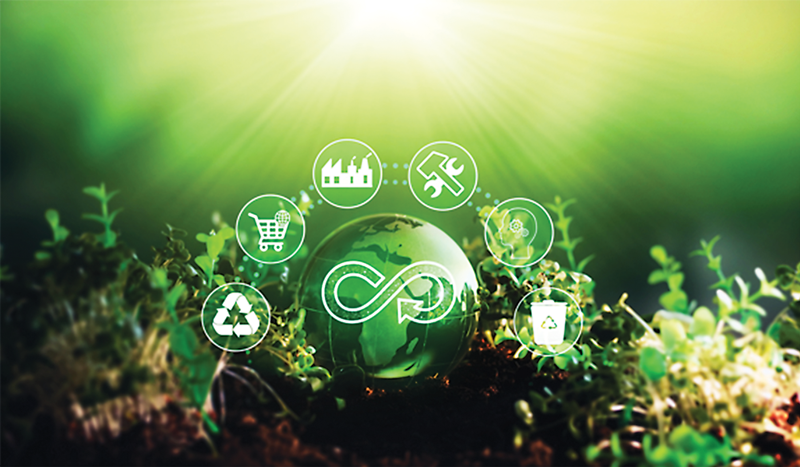When developing industrial parks (IPs) and economic zones (EZs) around Vietnam, investors are directed to strike a balance between socio-economic development requirements and environmental protection. Implementation, however, can differ greatly between localities, at times exacerbating existing problems.
Breakthrough solutions are therefore needed to ensure that IPs and EZs are indeed developed sustainably.
There are currently 418 IPs in Vietnam, of which 298 are in operation on a total area of nearly 92,200 ha, figures from the Legal Department at the Ministry of Natural Resources and Environment (MoNRE) show.
Of the 298 in operation, 272 have installed wastewater treatment facilities in line with environmental standards, or 91.3 per cent. The remainder lack such facilities.
All operating IPs have environmental impact assessments and environmental protection plans. Some 550,000 tons of hazardous waste is discharged from them each year.
Since 2017, MoNRE has inspected 242 establishments and projects, including IPs and projects located in IPs, with common violations identified including differences between the construction of environmental protection facilities and the environmental impact assessment, an absence of periodic waste monitoring reports, and a failure to meet national standards on wastewater discharged into the environment.
In 2022, the Vietnam Business Council for Sustainable Development (VBCSD) at the Vietnam Chamber of Commerce and Industry (VCCI) conducted a survey of 118 industrial parks nationwide, using an economic, environmental, social, and governance (EESG) framework of 19 key indicators, as part of the Sustainable Trade Initiative in Vietnam (IDH Vietnam). The survey revealed that IPs have paid little attention to green growth, and the adoption rate of EESG policies remains low. Only 39 per cent of companies surveyed have risk management policies to ensure compliance with environmental legislation, while only 21 per cent have a similar policy on social compliance, 10 per cent have a policy to promote circular economy practices, and 13 per cent have digital transformation policies.
Awareness about sustainable IPs is poor. Interviews show that 50 per cent of IPs have not heard about the concept of sustainable IPs, 30 per cent have some understanding, and 20 per cent have a clear understanding that sustainable IPs require balanced development across all four pillars of the EESG framework.
Only 22 per cent of IPs have international management certification and 77 per cent lack company-level audit information on financial, social, and environmental matters.
Barriers to address
At a recent conference on promoting sustainable IPs in Vietnam, many analysts said barriers relating to awareness, legal loopholes, and the administration of IPs hinder their sustainable development.
Deputy Director General of the Sao Do Investment Group, Ms. Tran Thi To Loan, said a sustainable IP model is built and managed with a combination of economic development goals, environmental protection, and social responsibilities. However, there are still many difficulties to tackle in developing sustainable IPs and EZs.
Some relate to capital and finance. IPs are mostly developed in rolling stages. Building synchronous functional subdivisions, wastewater treatment facilities, power grids, and water supply systems requires huge capital resources from the outset, she explained.
Many regulations relating to IP management are unclear, which hinders IPs from converting their operational models. For example, Decree No. 35/2022/ND-CP identifies an eco-industrial park model as an IP that participates in cleaner production and the more efficient use of resources. A specific target is in place, of 20 per cent of tenants adopting cleaner production. However, this regulation does not specify what “cleaner” is or what “the more efficient use of resources” means. Meanwhile, in order to use cleaner and more effective resources, the IP itself and its tenants must invest huge sums to change their technology. Without specific regulations, Ms. Loan said, it is difficult to encourage businesses to make such a transformation.
Another problem is that, currently, most waste from IPs is treated outside of their boundaries and there are few reports on the level of waste treatment conducted.
This is considered a major barrier, she explained, because businesses themselves are not monitoring their waste treatment, and improper treatment such as burning or dumping will cause environmental pollution.
Promoting green growth
Ms. Virginia Foote, a member of the American Chamber of Commerce (AmCham) in Hanoi and President and CEO of Bay Global Strategies, noted that US consumers are the largest customers of Vietnamese businesses, and that both US consumers and businesses care about the sustainability factor in goods produced in the global supply chain.
Vietnam, she said, needs to attract high-quality investment and focus on green production to supply products with less carbon emissions to meet demand among US, European, and Japanese consumers. It should also take into consideration the competitiveness of countries in the region and be ready for changes in the supply chain stemming from global trends. The “greening” of factories and IPs is therefore compulsory.
To promote the sustainable development of IPs, she proposed, tenants need to access renewable energy sources, not only rooftop solar power but also from large-capacity renewable energy plants, and also need access to clean water and effective water treatment technology.
It is necessary to have a mechanism to encourage businesses to seriously and synchronously implement regulations at IPs to achieve effective outcomes and avoid a situation where some follow these regulations while others ignore them.
In order to draw high-quality investment capital, IPs need to conduct sustainable development programs in line with global trends.
Director of the Institute of Strategy and Policy on Natural Resources and Environment, Mr. Nguyen Dinh Tho, suggested continuing to renew and complete related mechanisms and policies to develop IPs sustainably and adjust IP and EZ development targets and orientations in line with the new circumstances, with the State approving incentives on land, fees, and other forms of support.









 Google translate
Google translate